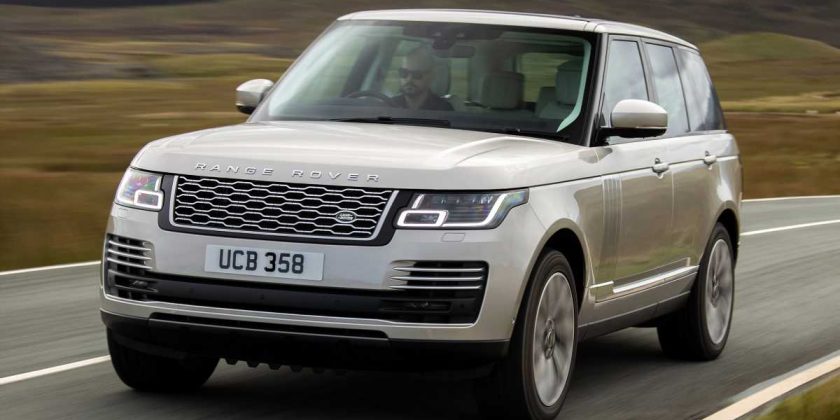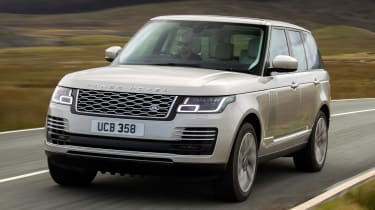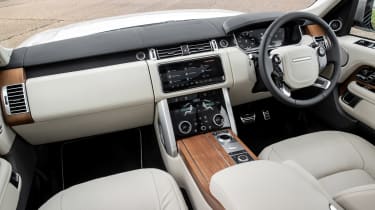The Range Rover swaps its old V8 diesel for a straight-six with mild hybrid assistance, and feels none the worse for it
4.0 out of 5
Verdict
The new diesel engine feels every bit a worthy replacement for the old V8 unit. For those who buy a Range Rover for its ability to swallow long distances, this is still a valid and attractive option – albeit one that comes with a penalty on CO2 emissions compared with the plug-in hybrid edition. Inside, though, the Rangie badly needs an upgrade on its infotainment tech, which is outclassed by rivals and even within the wider Land Rover range.
Rarely in the history of the Range Rover can there have been such a consistent drip feed of product improvements. Last year the Land Rover flagship gained in-line six-cylinder petrol power; then it plugged in with a four-cylinder hybrid. Now it’s time for the diesel range to get an overhaul – and it’s a biggie.
Out go the old TDV6 and TDV8 units, replaced by a single 3.0-litre straight-six Ingenium diesel incorporating 48-volt mild-hybrid technology – an integrated starter/generator that harnesses energy under braking and then uses it to boost engine response under acceleration.
Best luxury cars 2020
- BMW 7 Series vs Range Rover
- Range Rover review
- New Range Rover P400 Vogue 2020 review
- New Range Rover SDV8 2019 review
- Range Rover Vogue review
- New Range Rover PHEV 2018 review
- New Range Rover Autobiography 2017 review
- Used Range Rover review
It’ll be offered in two states of tune – D300, with 296bhp and 650Nm of torque, and the D350, which pumps out 345bhp and 700Nm of torque. That higher-output power figure eclipses that of the old TDV8 – which may prove a good thing, because while nobody at Land Rover will admit it, market forces could well make this the final all-new diesel motor introduced on the Range Rover.
More reviews for Range Rover
Car group tests
In-depth reviews
Road tests
Used car tests
Of course, if it’s pure on-paper efficiency you’re after, the P400e plug-in petrol remains the one to go for, with CO2 emissions of 75g/km. But the D300 and D350 have the potential to be better real-world choices for those who still use their Rangies over longer distances; the more modest diesel returns a claimed 33mpg and emits 225g/km of CO2, the D350 manages just over 30mpg and 241g/km.
It’s the D350 we’re trying here and while it is undoubtedly different from the old V8 flagship, it still feels reassuringly like the peak of the range on the sort of long-distance cruising that the Range Rover is so brilliant at. That 700Nm of torque is available from just 1,500rpm, so there’s more than enough twist to get up and moving quickly. Remember, after all, that this figure is a match for the P565 supercharged V8 petrol motor.
The engine is refined for a diesel, too – quiet and smooth in the main, and bordering on the sonorous when it is extended beyond 2,500rpm. That rarely needs to happen, though, because the transmission is calibrated so that the system does all of its best work by 3,000rpm, and shifts up accordingly. At a steady 70mph you’ll see barely 1,500rpm and the engine noise will have faded to a distant chug, easily drowned out by wind rush hitting the Range Rover’s imposing front end and side mirrors, and tyre roar from beneath.
The overall balance of the car hasn’t been adversely affected by the switch to the (presumably lighter) six-cylinder engine. There’s a little less weight over the nose but the Range Rover’s suspension still feels in command of pretty much everything it traverses. It’s still surprisingly straightforward to place this large SUV in corners – thanks to that elevated driving position and excellent forward visibility – and once you hook up with the transmission’s preferences for kickdown, you’ll also find it easy to harness the torque and make swift progress.
Inside, the Range Rover’s cabin remains a fine example of British design and luxury, with top-notch materials and a smart layout. It is hampered, though, by the older of Jaguar Land Rover’s infotainment systems, Touch Pro Duo – a clunky experience that’s outgunned by not only many of the car’s luxury rivals but also some of its more affordable stablemates, such as the Discovery Sport and Evoque.
The fact that the latest Pivi Pro set-up hasn’t been rolled into this update would suggest that its inclusion requires a more fundamental upgrade – so we’d suggest it’s one for the next generation of Range Rover. It can’t come quickly enough.
| Model: | Range Rover Autobiography D350 MHEV |
| Price: | £109,160 |
| Engine: | 3.0-litre 6cyl turbodiesel |
| Power/torque: | 345bhp/700Nm |
| Transmission: | Eight-speed automatic, four-wheel drive |
| 0-60mph: | 6.8 seconds |
| Top speed: | 140mph |
| Economy: | 30.8mpg |
| CO2: | 241g/km |
| On sale: | Now |
Source: Read Full Article



 Best luxury cars 2020
Best luxury cars 2020